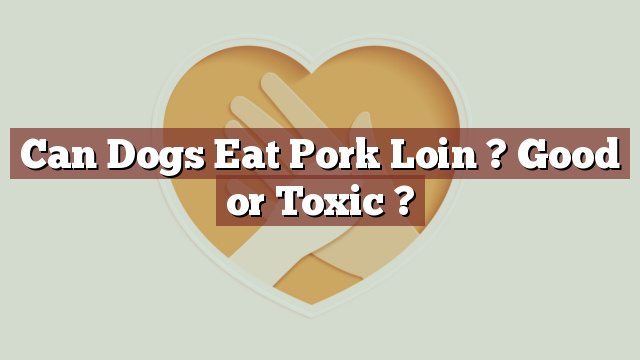Can Dogs Eat Pork Loin? Good or Toxic?
When it comes to feeding our furry companions, it is crucial to be aware of what foods are safe for them to consume. Dogs have different dietary needs compared to humans, and some human foods can be harmful or toxic to them. One food that often raises questions is pork loin. In this article, we will explore whether dogs can eat pork loin and provide insights into its nutritional value, safety, and potential risks and benefits for our four-legged friends.
Nutritional Value of Pork Loin for Dogs: Essential Facts
Pork loin, known for its tender and lean meat, is a popular choice for many human meals. It is a good source of protein, vitamins such as thiamin, riboflavin, niacin, vitamin B6, and minerals like iron, phosphorus, and selenium. However, it is important to note that the nutritional needs of dogs differ from ours. Dogs require a balanced diet that is specifically formulated to meet their unique nutritional requirements. While pork loin may offer some nutritional benefits, it is not an essential component of a dog’s diet.
Can Dogs Eat Pork Loin? Safety and Toxicity Explained
Can dogs eat pork loin? Yes, dogs can consume pork loin, but there are certain precautions to consider. Raw or undercooked pork can pose a risk of bacterial contamination, including the transmission of parasites such as Trichinella spiralis. These parasites can cause severe illness, including vomiting, diarrhea, and potentially life-threatening conditions. Therefore, it is crucial to ensure that pork loin for dogs is thoroughly cooked to eliminate any potential health risks.
Another aspect to consider is the seasoning and marinades often used in preparing pork loin for human consumption. Some seasonings, such as garlic and onion, can be toxic to dogs and should be avoided. Additionally, excessive consumption of fatty meats like pork loin can lead to pancreatitis, a painful inflammation of the pancreas in dogs. Therefore, it is important to remove any seasoning and trim excess fat before offering pork loin to your furry friend.
Potential Risks and Benefits of Feeding Dogs Pork Loin
As previously mentioned, the consumption of raw or undercooked pork can put dogs at risk of bacterial infections and parasite infestations. It is crucial to cook pork loin thoroughly to ensure your dog’s safety. Additionally, the high-fat content in pork loin can lead to weight gain and other health issues if consumed excessively.
On the other hand, pork loin can be a good source of high-quality protein that aids in muscle growth and repair. It also contains essential vitamins and minerals that contribute to overall health. However, it is important to remember that these nutritional benefits can be obtained from other sources that are specifically designed for dogs. It is always best to consult with a veterinarian before introducing any new food into your dog’s diet.
What to Do If Your Dog Eats Pork Loin: Steps to Follow
If your dog has consumed pork loin, it is important to monitor their behavior and health closely. If your dog shows any signs of illness such as vomiting, diarrhea, or abdominal pain, it is crucial to contact your veterinarian immediately. They will be able to provide you with the appropriate guidance on how to proceed.
Conclusion: Moderation and Proper Preparation Matter
In conclusion, dogs can eat pork loin, but it should be done with caution and moderation. Cooked pork loin, free from seasoning and excess fat, can be safely consumed by dogs. However, it is important to remember that pork loin is not a necessary part of a dog’s diet, and their nutritional needs are best met through a balanced, veterinarian-recommended diet specifically formulated for dogs. As responsible pet owners, we should prioritize our furry friends’ health and consult with a veterinarian if we have any concerns or questions about their diet.
Thank you for investing your time in exploring [page_title] on Can-Eat.org. Our goal is to provide readers like you with thorough and reliable information about various dietary topics. Each article, including [page_title], stems from diligent research and a passion for understanding the nuances of our food choices. We believe that knowledge is a vital step towards making informed and healthy decisions. However, while "[page_title]" sheds light on its specific topic, it's crucial to remember that everyone's body reacts differently to foods and dietary changes. What might be beneficial for one person could have different effects on another. Before you consider integrating suggestions or insights from "[page_title]" into your diet, it's always wise to consult with a nutritionist or healthcare professional. Their specialized knowledge ensures that you're making choices best suited to your individual health needs. As you navigate [page_title], be mindful of potential allergies, intolerances, or unique dietary requirements you may have. No singular article can capture the vast diversity of human health, and individualized guidance is invaluable. The content provided in [page_title] serves as a general guide. It is not, by any means, a substitute for personalized medical or nutritional advice. Your health should always be the top priority, and professional guidance is the best path forward. In your journey towards a balanced and nutritious lifestyle, we hope that [page_title] serves as a helpful stepping stone. Remember, informed decisions lead to healthier outcomes. Thank you for trusting Can-Eat.org. Continue exploring, learning, and prioritizing your health. Cheers to a well-informed and healthier future!

